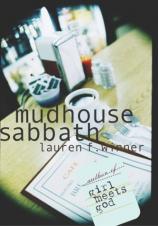Mudhouse Sabbath
Review
Mudhouse Sabbath
In her memoir GIRL MEETS GOD, journalist Lauren F. Winner talked about her conversion from Orthodox Judaism to Christianity and her attempts to bridge the two religions by letting her Jewish faith inform her new Christian faith. After seven years as a Christian, MUDHOUSE SABBATH finds Winner exploring eleven Jewish spiritual practices and traditions that she finds indispensable to her Christian life. In short, she finds herself returning to her roots. "This is a book about those things I miss," she writes. "It is, to be blunt, about spiritual practices that Jews do better. It is, to be blunter, about Christian practices that would be enriched, that would be thicker and more vibrant, if we took a few lessons from Judaism."
This slim volume, noteworthy for Winner's engaging voice and lucid prose (one wonders if she could rewrite the "Yellow Pages" and make them intriguing) is full of personal anecdotes mixed with spiritual musings. For Jews, action is the heart of faith, she writes. While she acknowledges "spiritual practices don't justify us. They don't save us," she realizes that the practicing of the spiritual disciplines "teaches us how to live as Christians."
Of all the Jewish practices, observing "Shabbat" or the Sabbath is the one Winner says she misses the most. A little aimless without the framework of the Jewish Sabbath of her past, she often spends her Sunday afternoons with a cup of hot chai and a good book at the Mudhouse, a coffee shop in Charlottesville, "not at all sure that I have opened my heart in any particular way." As she seeks to remedy this, she looks at the capitalistic misconception of the Sabbath --- "resting one day a week makes you more productive during the other six" --- and finds that it is at odds with the spirit of Shabbat. Rather than honoring ourselves, in observing the Sabbath "one is both giving a gift to God and imitating Him," she writes. For Winner, this realization brings about changes. She joins a Sunday Bible study, visits shut-ins, and forswears Sunday shopping ("A bigger sacrifice than you may realize!"). Nothing earthshaking, but important growth in faith journeys often starts with these types of small steps.
Winner also discusses spiritual disciplines such as fasting, prayer and hospitality; rites of passage including weddings, aging and mourning; traditions such as candle-lighting and affixing symbols of faith to doorposts; and more esoteric things such as our view of the body and making good food choices. She avoids romanticizing her past (kashrut or "keeping kosher," she admits can at times be "a royal pain in the neck"), while refusing to spare her new faith from critique ("Liturgy can be dull, and its dullness can be distracting"). Winner then flips the coin and looks at the positives --- when she kept kosher, she brought thought and intention to what she ate; when she uses her prayer book, she is freed from her narcissism and repointed toward confession, praise and a concern for others. There's a balance here that was likely difficult to achieve between acknowledging the most desirable traditions of her past and embracing the best of her new faith.
As of the writing of the book, Winner was working on a doctorate in the history of American religion from Columbia University. Although she's an academic, her scholarship is evident in her understanding of where and why some of the practices of Judaism and Christianity evolved. The glossary included is helpful in understanding unfamiliar Jewish or Yiddish words that appear in various chapters. But unlike many books written by academics, her knowledge is an almost invisible underpinning for the text, her prose is free of jargon and her voice is conversational. Readers will feel as if they are chatting over coffee with a long-time friend.
Toward the end of GIRL MEETS GOD we find Winner, who had gotten rid of most of her Jewish commentaries and books, rebuilding her Jewish library. In MUDHOUSE SABBATH, she likewise begins adding back into her new faith those essential "volumes" that she had left behind that she now finds necessary for a deeper relationship with God. Although unabashedly Christian, Winner is evenhanded in her treatment of both faiths: both obviously dear to her, both important to her understanding of God. Readers who long for a deeper sense of tradition and more vibrant, active faith practices will find Winner's book a good place for reflection.
Reviewed by Cindy Crosby on November 1, 2003
Mudhouse Sabbath
- Publication Date: November 1, 2003
- Genres: Christian, Nonfiction, Spirituality
- Hardcover: 128 pages
- Publisher: Paraclete Press (MA)
- ISBN-10: 1557253447
- ISBN-13: 9781557253446




